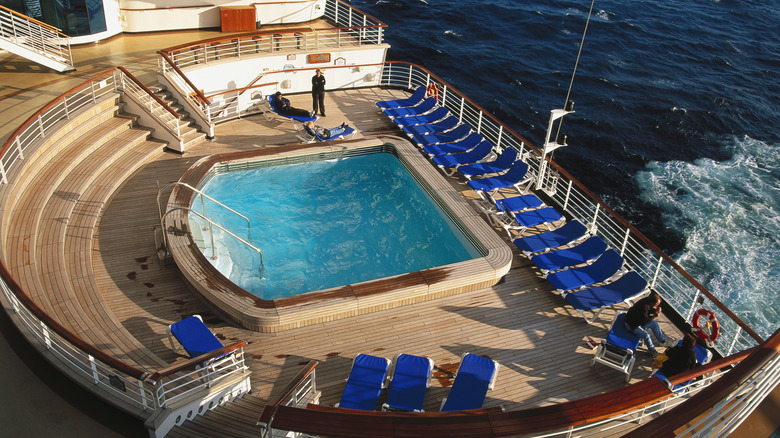The Unsettling Reason Why Cruise Ship Pools Are So Small
Technically speaking, cruise ships are just floating hotels that have the added benefit of taking you to all sorts of fun places. They've got all the amenities, activities, and room setups you'd expect, making them a home away from home where you can veg out for days or weeks. There's not much a hotel can offer that a cruise ship can't — except for an Olympic-sized pool, because that might tip the whole thing over. That's just one of the unsettling reasons why you may want to avoid taking a cruise.
Seasoned cruisers know the sad truth: cruise ship pools are notoriously puny. Sure, you can bask on the swanky sundecks and snag a lounge chair for some prime sunbathing (but be careful about hogging them, lest you want to drive your fellow cruisemates up the wall), but actually swimming laps in the pool? Forget it. These tiny, shallow puddles are essentially all the same whether you're on a luxurious Caribbean trip or a budget-friendly Margaritaville cruise.
One disappointed customer on Reddit described cruise pools as a "glorified feet soaker section." Then again, these pools are tiny for a reason: safety. A bigger pool could cause the ship to capsize because of something called the "free surface effect." So, next time you're disappointed by the size of your cruise ship's pool, just remember it's keeping you afloat — literally.
What is the free surface effect?
As disappointing as it is to not be able to practice your butterfly stroke in a cruise ship pool, they are deliberately designed to be small for safety purposes. Given that the pool is on a vessel floating in the ocean, the water sloshing around inside makes the ship less stable and more prone to tipping over — a phenomenon known as the "free surface effect." The larger the pool, the more it destabilizes the ship as the water moves around. Smaller pools mean less water movement, so the ship stays steadier. Plus, it's easier to install slosh-reducing features in a small pool than in a colossal one.
What's more, a user on the subreddit r/cruise explained that if pools were located in the lower parts of the ship, they could be larger. But who wants to swim in a dark, below-deck pool? "If people wanted below-deck pools, they'd be fine on the bottom of the boat," they penned. "However, people want pools in the sun, on 13-18 deck ships and that is a lot of moving mass to put at the top ... that's a lot of pendulum weight to counterbalance." So, unless you want to trade your sunny deck views for a dingy basement swim, you're stuck with the "glorified foot soakers."
You can opt for a cruise without a pool instead
If the thought of a cruise ship pool makes you queasy with visions of capsizing, you might want to consider pool-less options. River cruises and expedition ships often skip the typical pools, making them ideal if the idea of water sloshing around a big tank unnerves you. For instance, Avalon Waterways' 4-day river cruise from Budapest to Vienna features a sky deck with a whirlpool instead of a full-blown pool. Similarly, Viking's Viking Octantis expedition ship forgoes a traditional pool for three narrow "pools" of varying temperatures designed purely for lounging.
You can also just ignore the pool on your cruise ship. There's plenty to do onboard, from live entertainment to group activities to excursions, so you won't have to be stuck by the poolside throughout the trip. And truth be told, the chances of your cruise ship tipping over are minuscule. The Cruise Lines International Association offers travelers an assurance on its website: "Cruise lines have maintained an exceptional safety record — making cruising one of the safest ways to travel. In fact, cruise travel is safer than virtually every other form of travel." So relax, enjoy the sun, and remember: You're more likely to run out of sunscreen than see your ship capsize.

